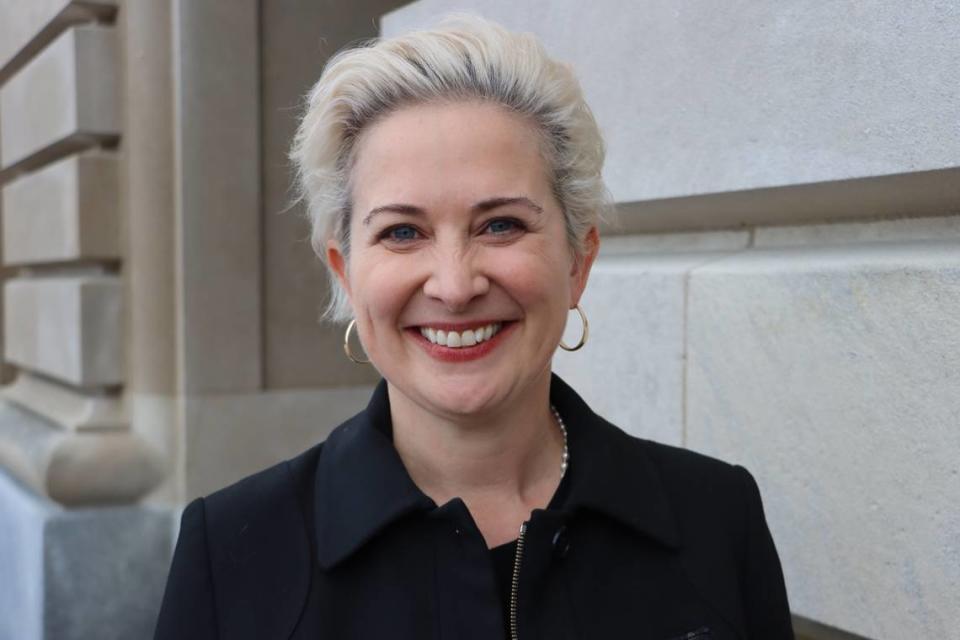Democrat newcomer seeks to knock off top Republican vote-getter for Kentucky auditor job
In her first general election in November 2015, Republican Allison Ball won the office of treasurer with the most votes of anyone seeking statewide office in Kentucky that year.
She also tallied the most votes in the 2019 general election to win a second term as Republicans again swept all but one of the statewide Constitutional offices.
Ball would like to repeat as the top voter-getter in seeking the office of auditor of public accounts on the November ballot, but Democrat Kim Reeder is trying to interrupt her string.
Both candidates are natives of Eastern Kentucky, Reeder from Rowan County and Ball from Floyd County. Both are also attorneys, but have taken different paths to the election.
The two are running for an office that oversees hundreds of audits a year, among them the financial transactions and performance of state agencies and agencies that receive state money, and spending by county fiscal courts, sheriffs and county clerks.
The office also has the authority to do special examinations of city finances and performance reviews of programs, giving it a potentially powerful watchdog role over taxpayer money.
The office has about 130 employees and a budget of $22 million, half from the state general fund and half from fees the office bills for doing audits, according to Michael Goins, spokesman for current Auditor Mike Harmon.
The current salary for the job is $148,109 a year.
ALLISON BALL
Ball says if voters want to know how she would perform as auditor, check her record in two terms as treasurer.
“I’ve maintained my focus on being that watchdog on taxpayer dollars,” Ball said.
She points to a number of initiatives, including launching a web site to provide greater transparency on state spending; returning record amounts of unclaimed property, such as tax returns, to Kentucky residents; pushing approval of a law requiring high school students to complete a financial literacy course to graduate; creation of the Kentucky Financial Empowerment Commission, which has programs that include financial literacy for students, state employees and veterans and expanding access to banking for low-income people; and working with the state of Ohio to set up a program at no extra cost to Kentucky taxpayers that allows young people with disabilities to save and invest money without losing benefits.

“I’ve been innovative,” Ball said.
The treasurer said her office has uncovered theft of state money, including one involving a state employee who stole nearly $45,000 from a program for families of children with special needs, and stopped cyberattacks, including one online $5.3 million fraud attempt.
Ball, 42, is married and has two children, ages 5 and 2. She was the first female statewide elected official in Kentucky to give birth while in office.
Her husband, Asa James Swan, is a native of Taylor County who has taught at Lindsey Wilson College and does leadership consulting.
Ball attended Liberty University for a degree in psychology and received her law degree from the University of Kentucky.
Before becoming treasurer, she was an assistant county attorney in Floyd County, prosecuting child abuse and other cases, and worked as a bankruptcy attorney.
Ball said her range of experience makes her the better candidate for auditor.
“I know how to get down into the weeds and make sure that things are done right and well,” Ball said.
Kentucky has come increasingly under Republican control at the state and local level, but Ball said she would not have a problem taking on people in her own party if warranted.
“You don’t show favorites. You don’t target people,” Ball said. “This job is ultimately about accountability and efficiency.”
Ball said her top priority as auditor would be protecting taxpayer money, and cited several specific audits she would plan to undertake or continue.
One would be an audit of the Jefferson County school system, where there was a breakdown in transporting students early in the school year, with some spending hours on buses and getting home late in the evening as parents worried about where they were.

Ball said during an appearance on Kentucky Educational Television that she would favor an appropriation by the legislature to pay for the audit, which could cost $500,000 or more, so that it wouldn’t drain money from the school system.
Ball also said she would pursue audits of the relief funds for victims of 2021 tornadoes in Western Kentucky and 2022 flooding in Eastern Kentucky.
The Herald-Leader reported earlier this year that some checks from the tornado-relief fund — which receives donated money — went to people not affected by the deadly December 2021 tornadoes.
Ball said she called for an audit of the tornado-relief fund more than a year ago but the Public Protection Cabinet said no.
Harmon’s office later said it would audit both the tornado and flooding funds at the request of lawmakers.
Gov. Andy Beshear criticized the audit of the tornado fund as politically motivated and defended his administration’s handling of money, saying the number of errors was miniscule and that the funds had been completely transparent, while providing the flexibility to move quickly in helping disaster victims.
Ball has pushed back against investing public money under an approach known as ESG, short for environmental, social and governance, which takes into account factors such as a company’s position on climate change or support for LGBTQ+ rights.
Ball said she has opposed that for investments by Kentucky’s public pension funds because it’s more about pushing a political agenda than focusing on maximizing returns on the money taxpayers provide.
“These are public dollars that are being invested so it needs to be as conservative and as safe as possible, making sure to get those good returns,” she said.
KIM REEDER
Reeder said her background explains her work ethic and desire to help people.
She grew up relatively poor in Rowan County, where her father worked in a sawmill and the family grew big gardens to get by.
“I want people who are working hard like my mom and dad did to have a chance for themselves, for their children, to have opportunities,” Reeder said.
Access to health care, a good education and a living wage offer those opportunities, Reeder said.

Making sure government spends money legally and efficiently, as the auditor’s office can do, plays a role in that because cutting waste and abuse means more money for programs that help people, Reeder said.
“I’m doing this because I want to, because I care very much about Kentuckians and Kentucky working people in particular, and wanting them to have good government and government that serves them,” she said.
Reeder, 54, who is single and has an adult daughter, went to Yale for a degree in political science and then received a masters in public policy from Duke University and a law degree from the University of North Carolina.
She worked as a tax attorney for nearly 20 years, including 14 years in California, advising large companies on tax matters — work that prepared her to dig into the fine print of financial details, she said.
An industry publication named her one of the Top 10 tax attorneys in the country in 2011, Reeder said.
Reeder said she returned to Kentucky in 2014 after he mother was diagnosed with a form of dementia.
She continued doing tax work, but also has taught communications at Rowan County High School; coached the speech and debate team to state titles; and taught at Morehead State University and in the Governor’s Scholars Program.
“My educational and professional credentials are exceptional in the United States economy generally and here in Kentucky,” Reeder said. “This is about being an experienced professional in this field.”
Reeder said if she is elected she would place an emphasis on performance audits, which can identify ways for public agencies to do a better job, and would want to seek more input from residents on things to audit, which she believes would increase trust in government.

On the question of auditing the Jefferson County school system, Reeder said the system was dealing with reduced transportation funding from the state legislature.
Any audit should start with the question of whether the allocations complied with the law, not with the problems with busing the first week of school, she said, noting that other districts also had problems.
Reeder said she also would be interested in auditing the effectiveness of domestic violence prevention and intervention efforts in Kentucky, and the funding gap between affluent and poorer school districts in the state.
That gap is the reason the Kentucky Supreme Court struck down the state’s system of public elementary and secondary education in 1989, ruling that the state had failed in its constitutional duty to provide for an efficient system of schools because some districts had much less money to spend per student than others.
In response, the legislature approved the Kentucky Education Reform Act, which considered a national model for school reform at the time and helped narrow the funding gap between school districts.
However, the Kentucky Center for Economic Policy said in a recent report that the gap between richer and poorer districts has crept back to a point larger than what it was before the 1989 Supreme Court ruling, in part because of inadequate state appropriations.
“It’s a really disappointing thing to know that we’re back in the same spot” as before the court decision, Reeder said.
RESPONSES TO QUESTIONNAIRE
The Herald-Leader asked each candidate a series of questions about the office and what her priorities would be if elected. Here are Ball and Reeder’s answers, in their own words.
What would be your top priority as auditor?
Ball: My top priority as Auditor will be to ensure that the primary responsibility of the Auditor’s office, which is to fight waste, fraud, and abuse, is carried out fairly and consistently all across the Commonwealth of Kentucky. As a former prosecutor, committed to accountability and treating everyone the same way.
Reeder: My top priority as Auditor would be to conduct an audit of state funding allocations to local school districts (i.e., SEEK funding) to determine whether these allocations comply with state law as it relates to overall adequacy, any disparity between wealthy school districts and poor school districts, transportation funding, and special education funding.
What specific changes would you make aimed at improving the office and its work, if any?
Ball: One thing I would like to bring with me from my time in the Treasurer’s office to the office of the Auditor would be my work on transparency. I’ve improved taxpayer access to government spending by establishing Transparency.Ky.Gov to give voters an opportunity to see how their taxpayer dollars are being spent. The more informed voters are on how their government is operating, the better. I’d continue that work by expanding beyond Frankfort to work with local and county governments to help them bring more transparency to their communities. I’d help untangle the avenues that might confuse voters and strengthen the processes by which they release their financial information to the public.
Reeder: There are two areas where I would make changes aimed at improving the office and its work. First, I would significantly increase the number of performance audits, which examine the effectiveness and efficiency of agency spending, conducted by the Auditor’s office. In addition, I would evaluate and seek input on the fairness of audit fees charged by the Auditor’s office to, for example, county governments.
Is there an example of a state government program or expenditure you believe needs more investigation by the office? If so, what is it and why?
Ball: The Jefferson County Public School system is ripe for an opportunity to look into its operations. As a mom, I was disappointed in what we saw in the early part of the school year in which buses were getting home late and school was later canceled. Taxpayers deserve to know what led to parents being left worried and confused. It’s been almost 10 years since JCPS has been audited and I believe it’s an appropriate time to do just that.
Reeder: One example of a possible performance audit (referenced above) would be to analyze the effectiveness of domestic violence prevention and intervention efforts in light of the high rates of intimate partner violence and stalking reported in Kentucky’s first statewide data report released on June 30, 2023.
How would you make sure partisan politics did not influence audit decisions and work?
Ball: The Auditor’s office should be non-partisan and all of government should receive fair and impartial treatment. Early in my career, I worked for a Democrat while I was an Assistant Floyd County Attorney. Despite having a different party affiliation, my boss knew that we could work together to follow the law and approach every case the same way; partisanship didn’t matter, only justice. I carried that non-partisan commitment into my duties as Treasurer, where I have worked across the aisle to pass legislation such as my bill to guarantee every student has financial literacy training before graduating from high school. The Auditor plays a vital role in ensuring taxpayer funds are not abused or wasted. I have the record to show I’m prepared to be a fair and impartial Auditor.
Reeder: The most effective way to avoid any appearance of partisanship in audit selection decisions or the audits themselves is to create a culture of transparency within the office. An important component of this culture would be to actively seek citizen input on audits that should be pursued. Input could be sought through town halls, increased promotion of the office’s “tip line,” and other means. Another key element would be requiring each audit report to include an easy-to-understand executive summary as well as robust analysis explaining in concrete terms why it was important to analyze this particular issue (if discretionary).
How would you make sure other agencies such as the Attorney General’s Office or Department for Local Government follow up on referrals from the auditor’s office about potential violations of law or policy?
Ball: As a former prosecutor, I have a record of working with law enforcement. Similarly, from my time as Treasurer, I know how to collaborate with the Attorney General’s office, the US Attorney’s office, and any other government officials necessary to ensure bad actors are held accountable.
Reeder: The Auditor can use the inherent authority of the office to shine a light on the status of referrals so as to keep Kentuckians informed on follow up, or lack thereof, occurring within other agencies.
Is there additional statutory authority, duties or funding you believe the office should have?
Ball: One of my first priorities upon taking office will be to work with the General Assembly to seek appropriations to lessen the cost of auditing on local county and city governments. This will allow for more taxpayer dollars to stay in their communities instead of being sent to Frankfort.
Reeder: Under the current funding system, the Auditor’s office receives funding from the General Fund and also collects fees when, for example, it audits county governments. The balance between these funding components should be evaluated to ensure that the costs of running the Auditor’s office are not being unfairly passed along to local government entities.

